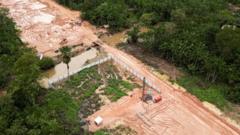A massive four-lane highway is currently being built through a portion of the Amazon rainforest to accommodate the upcoming COP30 climate summit in Belém, Brazil. Promising to ease traffic for the event, which will attract over 50,000 attendees including global leaders, the initiative has been met with outrage from local communities and environmental advocates.
With significant areas of forest being cleared, locals like Claudio Verequete, who once thrived on harvesting açaí berries from the now-razed land, fear for their livelihoods and the future of the ecosystem. Species that rely on the forest, including sloths, will find it harder to navigate their habitats due to the disruption caused by this construction.
The Brazilian government calls the highway a “sustainable” project, claiming it will feature wildlife crossings and bike lanes. However, critics argue that this deforestation contradicts the principles behind the climate summit itself.
In a broader context, while some local business owners anticipate economic growth from the summit-driven infrastructure improvements, many feel their voices are ignored. This clash of development and conservation highlights the dilemma faced by world leaders at COP30, questioning whether their efforts to combat climate change are jeopardized by the very actions taken to host them.



















